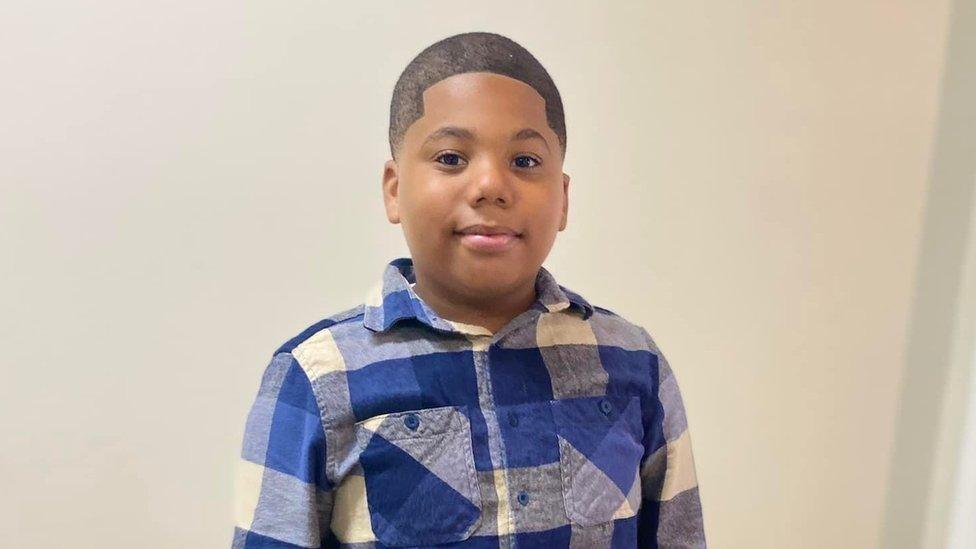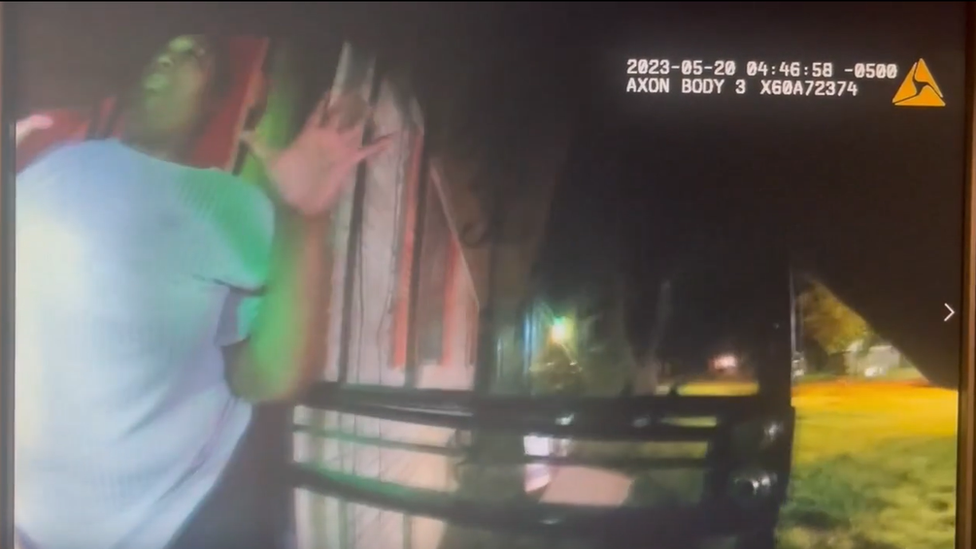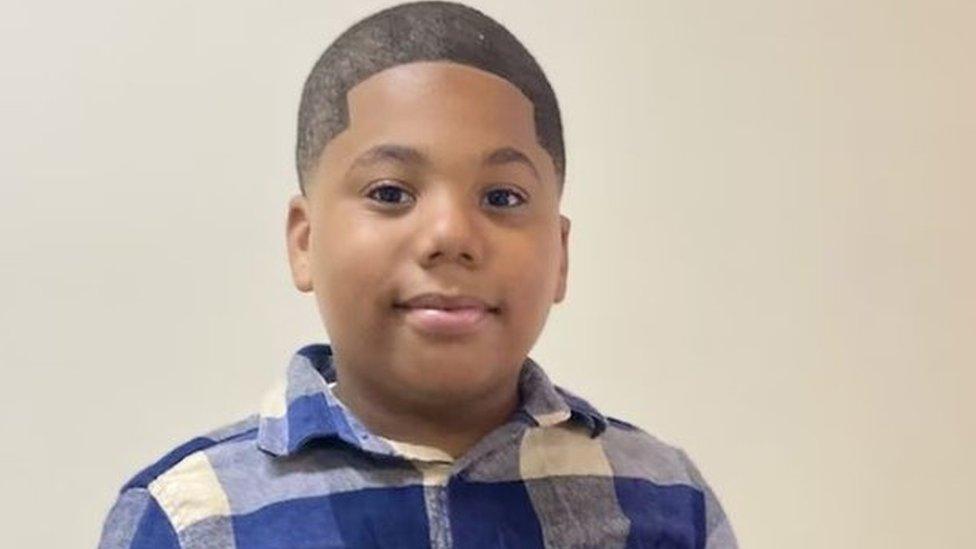Aderrien Murry: Audio and video offer clues on shooting of boy, 11, by police
- Published

Aderrien Murry survived the shooting but suffered a collapsed lung, fractured rib and lacerated liver
Attorneys have released 911 dispatch audio tapes that suggest mistakes were made in the lead-up to police shooting an 11-year-old boy in Mississippi.
It follows last week's release of body camera footage from the moments before Aderrien Murry was shot in his home after calling police for help.
He suffered a collapsed lung, fractured ribs and a lacerated liver. His family is suing the city where it took place.
The officer involved has been cleared of criminal conduct and reinstated.
The flurry of new information about the May 2023 shooting in the city of Indianola follows a nearly seven-month probe by the Mississippi Bureau of Investigation (MBI).
Last month, the state's attorney general said Sergeant Greg Capers will not face charges after a grand jury determined the bureau's findings showed no evidence of criminal conduct on his part.
Sergeant Capers, who was placed on unpaid administrative leave after the shooting, has since re-joined the Indianola Police Department.
But the Murry family has continued to argue the shooting was not justified, with Aderrien's mother, Nakala, pushing for footage from the incident to be publicly released.
The newly released 911 recordings raise questions about whether Mr Capers knew there was a child in the house when he and another officer responded to domestic disturbance calls placed by Ms Murry's mother, who was not there, and then by Aderrien.
A man later identified as John Nolden, the father of one of Ms Murry's other children, had shown up unexpectedly at the home in the early hours of the morning.
That led a frightened Ms Murry to give her son a cell phone and ask him to call for help, first by informing his grandmother and then by calling 911.
Last Friday, in response to Ms Murry's repeated pleas, state officials released body camera footage, external of the moments leading up to the shooting of Aderrien.
The video shows Mr Capers approaching the Murry home with a colleague, repeatedly banging on the front door and - with permission from the 911 dispatcher - unsuccessfully attempting to kick it open.
When Ms Murry opens the door, he is heard twice shouting: "Let me see your hands." Ms Murry immediately complies.
"Where's he at?" Mr Capers then asks twice. As Ms Murry gestures inside the home with her head, he asks her to come out of the house and she steps outside.

Nakala Murry is seen here exiting the home on Sgt Greg Caper's orders
The officer is then heard repeatedly asking the intruder to come out, adding "don't make us come in".
He also asks if the man is armed, to which Ms Murry appears to respond that he is not.
As Mr Capers enters the empty living room, Aderrien walks into the frame with his hands over his head.
Mr Capers immediately opens fire, shoots him in the chest and then says "Oh, my god".
As the boy screams in pain and runs out the door yelling for his mother, the officer begins calling for an ambulance on his dispatch radio.
"What did I do?" Aderrien is said to have asked his mother after being shot. "I don't want to die."
He spent four days recovering in a local hospital, during which he was placed on a ventilator and given a chest tube.
Sharing his story for the first time in May with Good Morning America (GMA), the child described feeling like he had been struck by "a big punch to the chest".
He also said he had previously wanted to be a police officer but changed his mind after the shooting.
In a December GMA interview, Mr Capers, who is also black, said the shooting was "spur of the moment" and "definitely wasn't intentional".
National law enforcement statistics suggest domestic disturbance calls are dangerous for US police, often leading to officer assaults and even deaths. Experts say that puts them on high alert.
Carlos Moore, an attorney representing the Murry family, said in a statement that the video footage "allows the world to independently assess whether the actions of Greg Capers were justified".
After the MBI declined to release copies of Aderrien's 911 call, saying that it would violate state law, Mr Moore released the tapes, external himself on Thursday.
The five minutes of audio detail four separate 911 calls, including the first from Aderrien's grandmother and the one placed by the boy himself.
The tapes suggest that the 911 dispatcher may not have conveyed to Mr Capers and his colleague that there was a boy inside the house and it was he who called for help.
"The audio recordings reveal that one caller advised the police that no weapons were involved, and another caller advised that there was a child in the house," Mr Moore said in a statement to The Enterprise-Tocsin local newspaper.
"This crucial information should have been known to the responding officers and should have informed their approach to the situation."
The city has so far declined to comment on either the video or audio releases.
The Murry family is currently suing the city and its police force for $5m (£3.9m).
The civil rights suit calls for Mr Capers and Indianola Police Chief Ronald Sampson to be fired.
It alleges the responding officers acted with gross negligence and reckless disregard "so outrageous that it shocks the moral and legal conscience of the community".
Indianola police were not immediately available for comment.
Related topics
- Published25 May 2023

- Published26 May 2023
